Photo: David Livingston/Getty Images
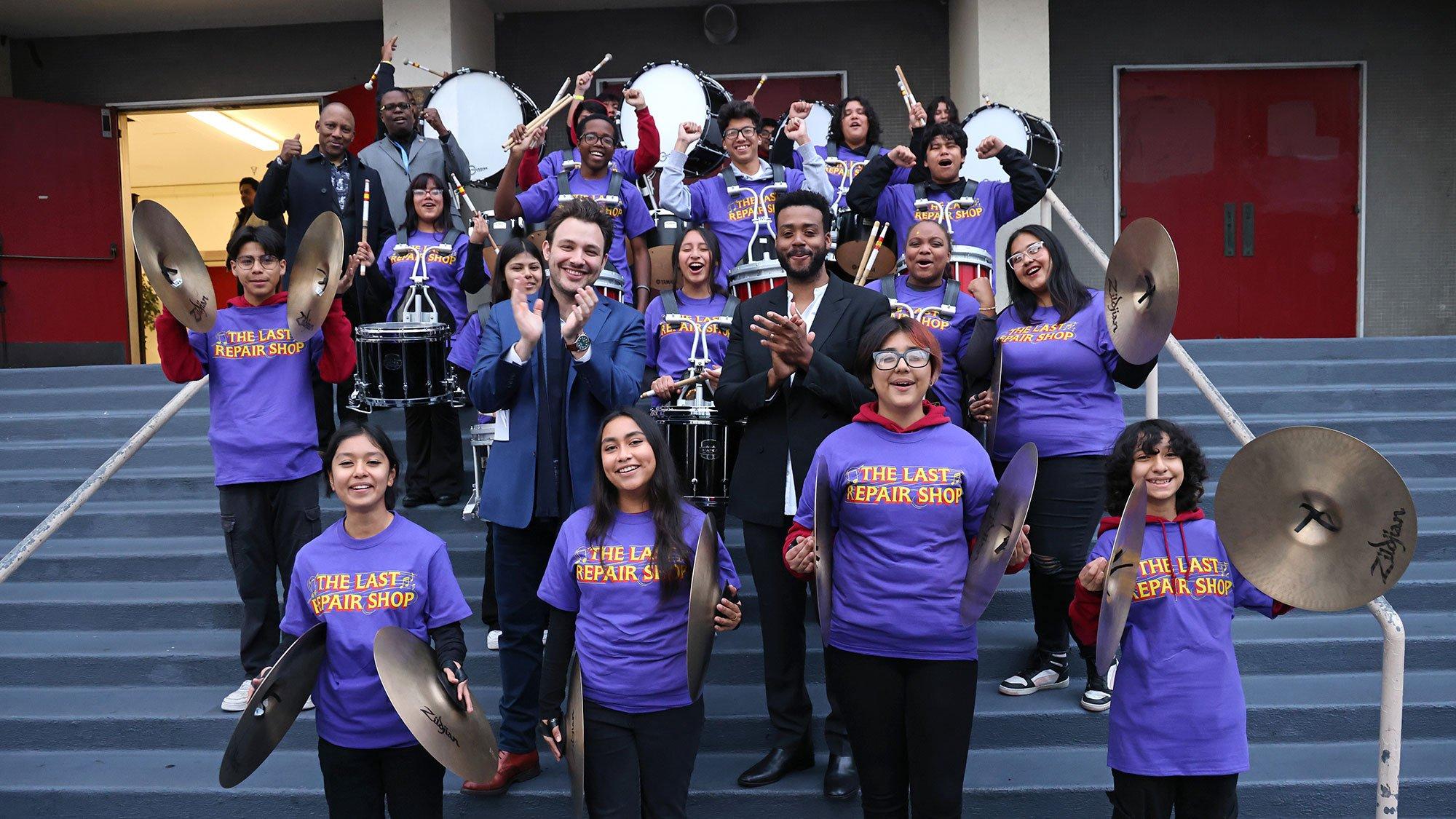
interview
'The Last Repair Shop' Filmmakers Share Behind-The-Scenes Stories About Oscar-Winning Documentary
The L.A. Unified School District's Musical Instrument Repair Shop is the subject of 'The Last Repair Shop,' which won the 2024 Oscar for Documentary Short Film. The filmmakers talk about creating the documentary short and the impact of music education.
Editor’s Note: Updated Sunday, March 10, to reflect the results of the 96th Academy Awards.
Since it opened its doors in 1959, a repair shop in a downtown L.A. warehouse has been making music accessible for kids.
The facility is owned by the Los Angeles Unified School District (LAUSD) and has restored many of the 130,000 musical instruments in circulation for more than 500,000 students. It’s one of the last publicly funded services of its kind in the United States and provides repairs at no cost to students or their families.
The LAUSD’s Musical Instrument Repair shop has largely operated under the radar until Academy Award-winning filmmaker Ben Proudfoot and GRAMMY-nominated pianist and composer Kris Bowers shone a cinematic light on it. Their film, The Last Repair Shop, won the Oscar for Documentary Short Film at the 2024 Academy Awards.
The 40-minute documentary profiles four of the shop’s 12 technicians. Each is responsible for repairing a different class of instrument: brass, woodwinds, strings, and pianos. In touching interviews, the technicians share their stories and how the work has transformed their own lives.
Proudfoot, the 33-year-old founder and CEO of L.A.-based Breakwater Studios Ltd., tells GRAMMY.com that the "magic" of these personal stories created a unique narrative. Much like the instruments they repair, Proudfoot says the technicians were once "broken" and were "restored by music in some way."
In the film, guitarist Dana Atkinson, who works in the strings department, compares detecting a buzz in a cello with the process of coming out as gay.
"I thought I was broken," Atkinson says in the film, crediting his musician mother for teaching him that "music is like swimming. The rhythm is constantly in the moment, and if you stop, there is no music. Whatever you do, don’t stop."
Paty Moreno left her native Mexico to pursue the American dream more than two decades ago, but found herself struggling to survive in L.A. as a single mother with two young children. "We were so poor. Sometimes, we didn’t have food," she recalls tearfully in the documentary.
2024 Oscars: Watch Performances & Highlights
2024 Oscars: Watch Billie Eilish And FINNEAS Perform A Heartrending Version Of "What Was I Made For?" From The Motion Picture 'Barbie'
2024 Oscars: Watch Ryan Gosling And Mark Ronson Perform A Soaring, Hilarious Version Of "I'm Just Ken" From The Motion Picture 'Barbie'
2024 Oscars Red Carpet: Music Icons & Artists Shine Including Billie Eilish, Mark Ronson, Danielle Brooks & More
2024 Oscars: Billie Eilish and FINNEAS Win Best Original Song For "What Was I Made For?" From The Motion Picture 'Barbie'
2024 Oscars: Watch Becky G Perform "The Fire Inside" From The 2023 Comedy-Drama ‘Flamin’ Hot’
2024 Oscar Nominees Who Have Won A GRAMMY: Billie Eilish, Martin Scorsese & More
2024 Oscars: Watch Jon Batiste Perform A Poignant Rendition Of "It Never Went Away" From The Documentary Film 'American Symphony'
2024 Oscars: Ludwig Goransson's Masterful Composition for 'Oppenheimer' Wins Best Original Score
2024 Oscars: Watch Scott George and the Osage Singers Perform "Wahzhazhe (A Song For My People)" From 'Killers Of The Flower Moon'
'The Last Repair Shop' Filmmakers Share Behind-The-Scenes Stories About Oscar-Winning Documentary
How Afrobeats Star Bobi Wine Took On Uganda’s Dictatorship
Driven by her mother’s words to her as a child that she could "do anything in life," Moreno took a complicated instrument-repair technician test to work in the brass section in the shop, which at the time in the early 2000s, had only ever had male employees.
Woodwind technician Duane Michaels shares in the film that he was often bullied as a child, but found solace in the 1935 film, The Bride of Frankenstein. In one scene, a soothing violin played by a blind man brings tears to the monster’s eyes. Michaels was immediately bitten by the "fiddle bug," convinced his mother to buy him a $20 violin, and went on to help form a hillbilly-bluegrass band, called the Bodie Mountain Express, which opened for Elvis Presley at his 1975 New Year’s Eve concert.
That $20 instrument set Michaels on a life path, and he recognizes the power of music education to do the same for others. "Kids have a chance to play instruments that they can’t afford," he says in the film. "That one instrument can change their whole life."
*Duane Michaels*
The Last Repair Shop took four years to complete, and became deeply personal for 34-year-old Bowers, a former LAUSD student. The pianos Bowers played during his elementary and middle school education were tuned by shop supervisor Steve Bagmanyan — another of the film's subjects.
Bagmanyan remembers falling in love with the piano as an ethnic Armenian boy growing up in then-Soviet Republic, Azerbaijan. He fled to the U.S. with his mother in the late 1980s during the First Nagorno-Karabakh War in which his father was killed.
Bowers says that including Bagmanyan in the film became an expression of gratitude for “someone who did directly impact me.”
“I was able to say thank you,” recalls L.A.-born Bowers. “It was very special.”
The end result of the restorative work provided by Bagmanyan and the other shop technicians has a more far-reaching effect, according to Proudfoot. "Learning how to play a musical instrument has a profound impact on who you are that makes not just good musicians, but good citizens," he says.
Bowers also spent about 45 minutes interviewing student musicians, each of whom details what their instrument means to them.
Ismerai Calcaneo talks about how music "changed" her life when she started playing saxophone in school at the age of 9. The instrument helped her "be more disciplined."
"I have to be on time, I have to practice, I have to look good — it helps me focus more," she says in the film. "When I am feeling tense, when I’m feeling sad or angry, the saxophone calms me down."
For Amanda Nova, playing the piano before an audience is a source of empowerment and a way to reduce stress. "I’m scared that I might not find a purpose in life," she says. "But once I’m on stage, all that tension goes away."
Bowers hopes that the stories in The Last Repair Shop shine a light on "how much music education can do beyond create incredible musicians." He tells GRAMMY.com that being in a school jazz band had a significant impact on his life.
"Listening in the jazz context is such a deep form of communication, and it definitely translates into how I listen in my life outside music," says Bowers, who directed the 2020 Oscar-nominated documentary short, A Concerto is a Conversation, with Proudfoot.
"When it comes to young people, we’re very clear on the idea of what sports can do when it comes to discipline, but not everybody wants to be an athlete," he says. "If we’re able to understand the value of sports in helping them with other aspects of their lives, I really feel that the same argument can be made for music."
Proudfoot echoes Bowers’ sentiment.
Music "teaches you how to listen, how to play in harmony and collaborate," he says, adding that, hopefully, the experience "provides you with a reasonable example of having discipline and learning how to conquer a complex thing, which is a useful skill in life."
Both Bowers and Proudfoot hope the film inspires people to invest in music education.
Their film certainly seemed to strike a chord. On Feb. 20, the LAUSD Education Foundation launched a $15-million capital campaign called The Last Repair Shop Fund to support the restoration operation.
As the final moments of The Last Repair Shop, an orchestra featuring LAUSD alumni and current students perform a piece composed over a weekend by Bowers, who also penned the score for the movie-musical, The Color Purple, which was shortlisted for best score at this year’s Academy Awards). The scene sweetly threads the impact of music education on youth and adults.
The dedicated technicians toiling away in a nondescript shop also have high hopes for the musicians whose instruments they care for.
“In a way, you can feel like you’re fixing an instrument for a future GRAMMY winner,” says Michaels. “If you want to kind of dream a little bit."
Virginia's Annie Ray To Be Honored With 2024 Music Educator Award
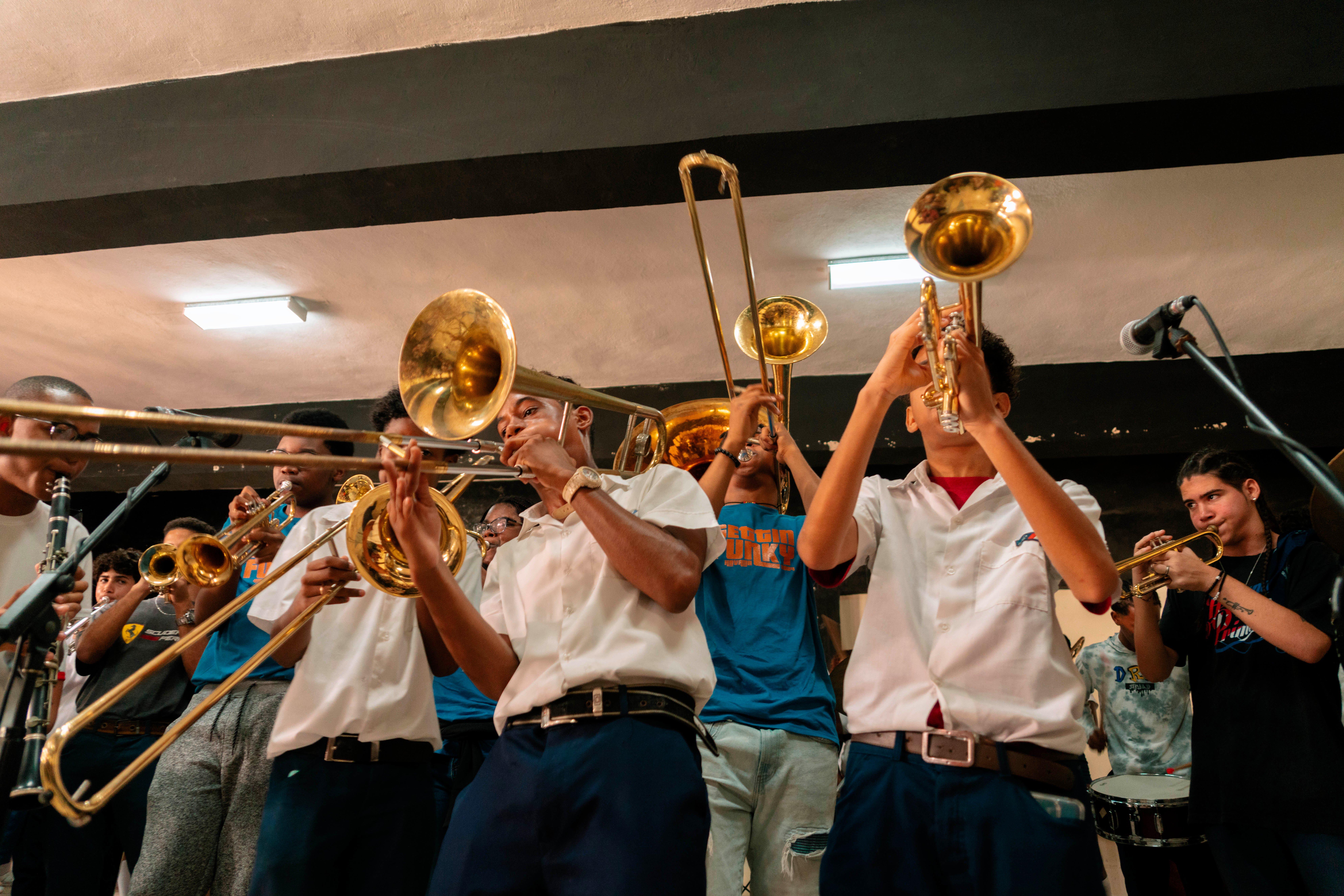
Photo: Eduardo Reyes Aranzaez
feature
At Getting Funky In Havana, Young Musicians Feel The Power Of Cross-Cultural Connection
An annual program organized by the Trombone Shorty Foundation and Cimafunk, Getting Funky In Havana explores the deep connections between Cuba and New Orleans — and provides student musicians with once-in-a-life-time learning opportunities.
It’s sweltering inside the Guillermo Tomas Music Conservatory, a primary school in Havana’s Guanabacoa neighborhood, where American visitors enjoy what will likely be the best school recital they'll ever see.
A series of teen and tween musicians — some in trios and quartets, others in larger ensembles — are playing a mix of Latin jazz, orchestral overtures and even a rousing rendition of the Ghostbusters theme. During an interpolation of Aretha Franklin's "Think," three young horn players burst to the front of the group in a competitive but friendly battle of brass.
The performance is the centerpiece of Getting Funky in Havana, a four-day music and cultural exchange program developed by GRAMMY-nominated Cuban funk artist Cimafunk, GRAMMY-winning New Orleans multi-instrumentalist Trombone Shorty's namesake foundation, and Cuba Educational Travel. Now in its third year, Getting Funky brought nearly 200 American music lovers, artists and students to Havana in January to explore the deep connections between Cuban and New Orlenian sounds through a series of performances, educational activities and panels.
"Cuba and New Orleans have a long line of influence, and we have special things that happen in both places that people can hear through our music," Trombone Shorty, born Troy Andrews, tells GRAMMY.com. "Passing along music and knowledge is…how the music's staying alive. I always try to tell the kids, learn everything that came before you, but also be very innovative."
While there are many conservatories in Havana, Guillermo Tomas was chosen in part for its similarities to New Orleans' Treme neighborhood, where many of the Trombone Shorty Foundation students live. Guanabacoa is "probably the deepest Afro-Cuban cultural neighborhood" in Havana, says Foundation Executive Director Bill Taylor.
Those shared roots and experiences were on display during several capstone concerts, which were also open to Havana residents. At a massive outdoor concert blocks away from Havana's famous Malecón, Getting Funky attendees enjoyed performances from Cuban salsa legends Los Van Van, reparto star Wampi and Shorty's Orleans Avenue. At a pinnacle performance the day before, more than 30 artists gathered at Havana arts hub La Fabrica for a sold-out international jam. Shorty, Big Freedia, Ivan Neville, percussionist Pedrito Martinez, PJ Morton, Tarriona "Tank" Ball, drummer Yissy Garcia and others joined forces with Cuban artists Reina y Real and X Alfonzo to create an unceasing groove.
Cuban and American students perform outside Guillermo Tomas┃Eduardo Reyes Aranzaez
While the concerts certainly brought the energy to a fever pitch, the beating heart of Getting Funky is its mission of music education. Ten members of the Trombone Shorty Foundation's brass band traveled to Cuba, where they performed at Getting Funky's opening night party and several other events. Throughout the week, the New Orleans students shared stages with their Cuban counterparts, learning each others' musical idioms and finding common ground.
"So much of the music [we hear in New Orleans comes] from Africa through the Caribbean to New Orleans, then spreading throughout the United States. When our students connect with those [Cuban] students, there's a natural, symbiotic connection that takes place," Taylor says.
High school senior and sax player Dylan Racine called the trip — his first time out of the country — a life-changing experience. "I learned so many new skills on this trip, including how to network, how to collaborate with young people from a different culture than me, and more," he says via email. Drummer and pianist John Rhodes, another senior, added that the experience was invaluable.
"I was able to interact with another culture and understand other young people through music. Although we couldn't speak the same language, we understood each other musically," he writes.
Both Cuba and New Orleans' unique musical cultures require constant innovation to survive, Taylor adds. "You honor the past, but it needs an infusion of new life in order to thrive. Getting Cuban musicians together with New Orleans musicians infuses a shot of energy into both of those musical styles."
The trip also put students from both countries in contact with working musicians, whose own perspectives were expanded by the experience.
"Music education and pedagogical expertise is so important. We need the next level to come up and be dope, just like we are," says trumpeter Keyon Harrold, whose work has taken him from sessions with Beyoncé to the 2024 GRAMMYs. This was Harrold’s second year at Getting Funky. "It's even more visceral and engaging to actually see these kids at the age of 10, 11, 12, and to know that in five years they're going to be the next."
For many of the musicians who attended, Getting Funky was an inspirational experience that furthered their existing work as well. "I perform for a living, but performing and playing with [students] is super dope. [Their energy is] clean," says GRAMMY-winning producer, rapper and mentor Deezle. "If I can in any way help to guide their path away from the pitfalls that I've encountered and endured, I would love to do that."
Legendary singer/songwriter Ivan Neville said he was blown away while watching young musicians from different worlds performing together. "This music was making their souls feel so good. I know music is good for the soul, but it was another level that I saw."
Fabio Daniel (center) and members of Primera Linea, or "first line"┃Eduardo Reyes Aranzaez
Since Getting Funky In Havana was established in 2020, the program has had a measurable impact on Cuban students' lives. In 2023, several young Cuban musicians traveled to New Orleans during JazzFest, where they visited Shorty’s studio and performed together at legendary venue Tipitina's. When the group returned home, they formed their own brass band, Primera Linea.
"This band is working; they are playing many places in Havana and that's thanks to the project. They were so into the satisfaction of [feeling] that they are valued," says Erik Alejandro Iglesias Rodríguez, who records as Cimafunk. "They are learning good quality things in terms of human relationships and in terms of music. [The program is] something that changes their mentality and lets them know that they can make it."
While Cuba harbors an incredible amount of musical talent, "making it" as a musician in the country comes with a unique set of challenges. The country's shrinking economy, high rate of inflation and low monthly incomes have 62 percent of Cubans reporting that they "struggle to survive" financially, according to a 2023 survey. Purchasing a professional calibur instrument, which may cost hundreds or thousands of U.S. dollars, often comes with great sacrifice.
It's an emotional day back at the Guillermo Tomas, where 10 of the school's top students will be awarded an instrument.
"An instrument is not something you can buy in a store," says Amanda Colina González, an art historian and one of the trip guides, who studied saxophone in conservatory. Colina González, like the majority of students, was given an instrument to play for the duration of her studies but had to return it to her school upon graduation. Remembering that moment brought tears to her eyes.
Because of its high cost and the possibility of leading to international travel, owning their own instrument can truly change a young musician's life. Getting Funky has donated approximately 50 instruments to Cuban students over three years of programming.
Fifteen-year-old Daniela Hernandez was awarded a trombone for her skill and dedication to music outside of school. Harried and teary-eyed after the recital, she shared her happiness and pride for being able to play with musicians who she's long admired. She plans to use her new trombone to study and will "take it with me everywhere."
Daniela and classmate Fabio Daniel (who received a trumpet during the first edition of Getting Funky in Havana in 2020) joined Trombone Shorty onstage at Getting Funky, performing for more than 15,000 people. Several of their friends and classmates brought their instruments to the concert — the largest held in Cuba in the last four years — and played back at the band from the crowd.
"Cuban musicians really enjoy playing and making other people feel joy through music,” Daniela says. Fellow trombone player and awardee Cristian Onel León says it's important to play for people outside of Cuba, and enjoys teaching people about his country's rhythms and keys. "I’m [also] learning other forms of playing, that aren’t mine. And it feels good,” he adds.
The program's instrument donation is spearheaded by the long-running nonprofit Horns To Havana, and supported by the Gia Maione Prima Foundation and private donors. Tickets purchased to attend the program also fund its efforts; Taylor says 2024's Getting Funky raised approximately $50,000. The Trombone Shorty Foundation hopes to continue the annual event, and expand into different countries; a 2025 Havana trip is already in the works.
For Rodríguez, who recently moved to New Orleans, the effect of this musical exchange is tangible. He's noticed more musicians who are open to collaborating across borders, and is working on new music with artists who have attended Getting Funky in previous years.
"Just jamming changes everything," he says. "That changes the minds of people; that changes the sound."
The connections made during Getting Funky have led to a variety of opportunities for students on both sides of the Gulf of Mexico. Foundation alto saxophonist Jacob Jones credits the trip for broadening his way of thinking while playing music; Deezle says he wants to get Cuban trumpeter and bandleader Fabio Daniel on a track; Primera Linea may perform at San Francisco's Outside Lands festival in August.
"To be able to facilitate that, and give to these young musicians of Cuba, is unbelievable," Andrews says of the program. "It's just a blessing to be able to be a blessing and help out the next generation, and help those musicians see a brighter future."
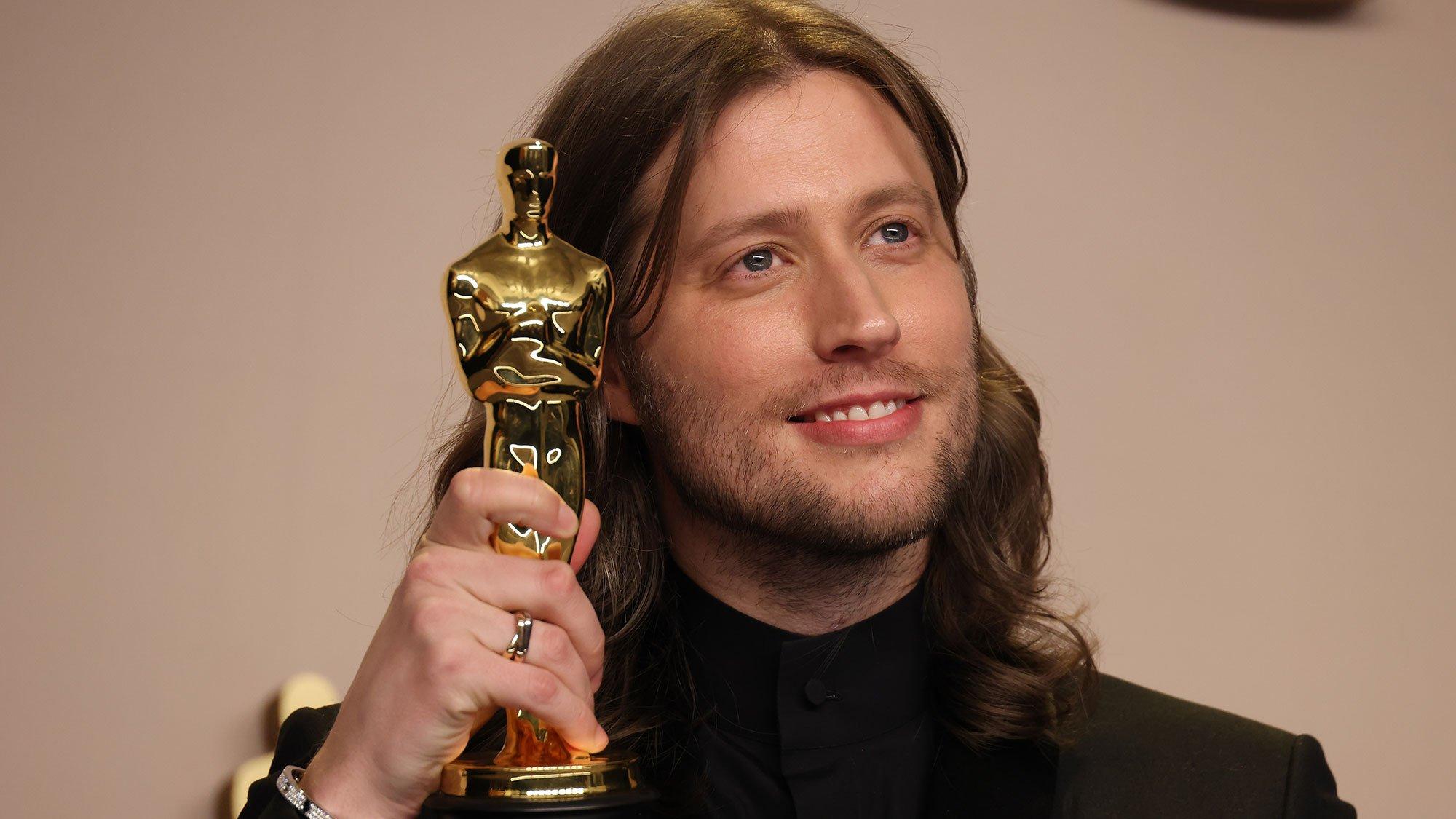
Photo: John Shearer/ WireImage/ Getty Images
video
2024 Oscars: Ludwig Goransson's Masterful Composition for 'Oppenheimer' Wins Best Original Score
The 'Oppenheimer' win by one of the youngest composers to ever receive the award for Best Original Score, marks a second Oscar victory for Ludwig Goransson.
Ludwig Göransson's captivating composition for Oppenheimer has triumphed in the Best Original Score category at the 2024 Oscars.
Göransson's victory represents his exceptional talent and innovative approach to film scoring, as one of the youngest composers to ever receive the Best Original Score Oscar. It marks his second win in the category — he took home his first Oscar in 2019 for Black Panther. Göransson's work on Oppenheimer also won at the 2024 GRAMMYs for Best Score Soundtrack For Visual Media (Includes Film And Television).
Göransson's work stood out among the competition, going up against the scores of American Fiction, Indiana Jones and the Dial of Destiny, Killers of the Flower Moon, and Poor Things. His ability to convey deep emotional narratives and complex historical contexts through his scores has established him as one of the most innovative and sought-after composers in Hollywood.
2024 Oscars: Watch Performances & Highlights
2024 Oscars: Watch Billie Eilish And FINNEAS Perform A Heartrending Version Of "What Was I Made For?" From The Motion Picture 'Barbie'
2024 Oscars: Watch Ryan Gosling And Mark Ronson Perform A Soaring, Hilarious Version Of "I'm Just Ken" From The Motion Picture 'Barbie'
2024 Oscars Red Carpet: Music Icons & Artists Shine Including Billie Eilish, Mark Ronson, Danielle Brooks & More
2024 Oscars: Billie Eilish and FINNEAS Win Best Original Song For "What Was I Made For?" From The Motion Picture 'Barbie'
2024 Oscars: Watch Becky G Perform "The Fire Inside" From The 2023 Comedy-Drama ‘Flamin’ Hot’
2024 Oscar Nominees Who Have Won A GRAMMY: Billie Eilish, Martin Scorsese & More
2024 Oscars: Watch Jon Batiste Perform A Poignant Rendition Of "It Never Went Away" From The Documentary Film 'American Symphony'
2024 Oscars: Ludwig Goransson's Masterful Composition for 'Oppenheimer' Wins Best Original Score
2024 Oscars: Watch Scott George and the Osage Singers Perform "Wahzhazhe (A Song For My People)" From 'Killers Of The Flower Moon'
'The Last Repair Shop' Filmmakers Share Behind-The-Scenes Stories About Oscar-Winning Documentary
How Afrobeats Star Bobi Wine Took On Uganda’s Dictatorship
Göransson's composition for Oppenheimer serves as the heartbeat of the movie, underpinning the film's exploration of the moral complexities and monumental impact of J. Robert Oppenheimer's work on the atomic bomb. Through his music, Göransson invites audiences into the internal and external conflicts faced by the "father of the atomic bomb," providing a sonic backdrop that is as thought-provoking as it is visceral.
Read more: Watch: Ludwig Göransson Discusses His GRAMMY Win For 'Oppenheimer' At The 2024 GRAMMYs
The award was presented by fellow GRAMMY winners, Ariana Grande and Cynthia Erivo, who will star together in the Wizard of Oz big screen adaptation of the musical Wicked as Glinda and Elphaba respectively, premiering on the silver screen later this year. Speaking to the power of music to leave an indelible mark on the viewer through film, Grande said, "a great film score can leave a handprint on our hearts forever. It can ignite wonder and astonishment, make us feel sadness and longing and even transport us to new worlds."
Göransson achieved just that. In his acceptance speech, Göransson thanked his colleagues, and stars of the film for contributions to his distinctive vision. "Christopher Nolan, it was your idea to use a violin in the score and it allowed me to work and collaborate with my wonderful wife and acclaimed violinist, Serena Göransson," he said.
Göransson ended his speech by acknowledging his parents, "Thank you for giving me guitars and drum machines and not buying me video games."
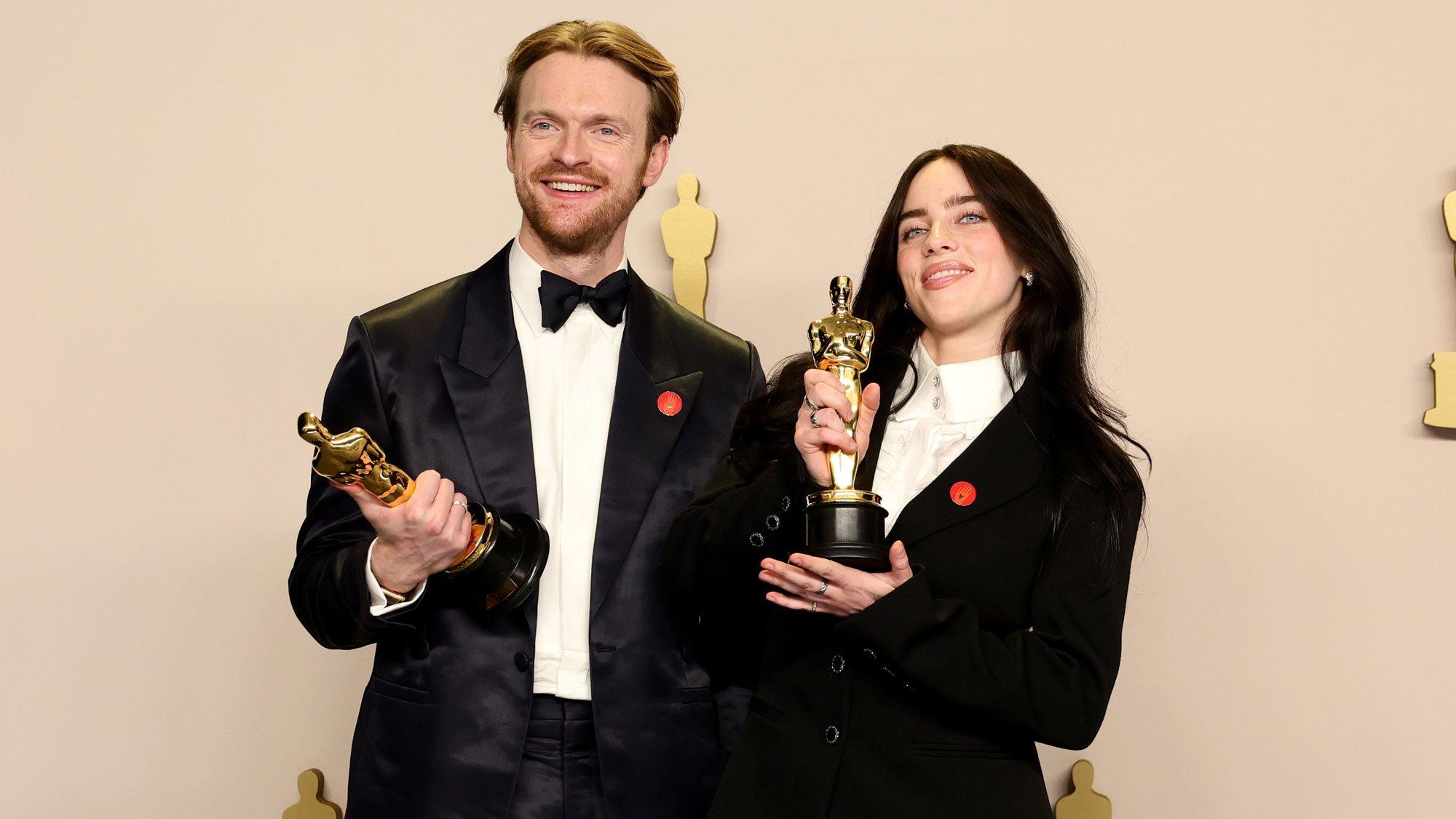
Photo: Arturo Holmes/Getty Images
news
2024 Oscars: Billie Eilish and FINNEAS Win Best Original Song For "What Was I Made For?" From The Motion Picture 'Barbie'
The duo's win for "What Was I Made For?" [From The Motion Picture 'Barbie'] marks the second Oscar win for Billie Eilish and FINNEAS, making Eilish the youngest two-time Oscar winner ever.
Sibling duo Billie Eilish and FINNEAS are taking home more awards "What Was I Made For" [From The Motion Picture *Barbie*], this time at the 2024 Oscars, winning the prestigious Best Original Song award for their heartfelt ballad.
Once again, they've proven their unparalleled talent crosses effortlessly between the realms of music and film. Billie Eilish and Finneas won their first Oscar in 2022 for Best Original Song with "No Time to Die," the theme for the James Bond film of the same name.
Fittingly, the award was presented by two GRAMMY-winning musical performers, Ariana Grande and Cynthia Erivo, who star as Glinda and Elphaba in the Wizard of Oz big screen adaptation of the musical Wicked, premiering on the silver screen later this year.
2024 Oscars: Watch Performances & Highlights
2024 Oscars: Watch Billie Eilish And FINNEAS Perform A Heartrending Version Of "What Was I Made For?" From The Motion Picture 'Barbie'
2024 Oscars: Watch Ryan Gosling And Mark Ronson Perform A Soaring, Hilarious Version Of "I'm Just Ken" From The Motion Picture 'Barbie'
2024 Oscars Red Carpet: Music Icons & Artists Shine Including Billie Eilish, Mark Ronson, Danielle Brooks & More
2024 Oscars: Billie Eilish and FINNEAS Win Best Original Song For "What Was I Made For?" From The Motion Picture 'Barbie'
2024 Oscars: Watch Becky G Perform "The Fire Inside" From The 2023 Comedy-Drama ‘Flamin’ Hot’
2024 Oscar Nominees Who Have Won A GRAMMY: Billie Eilish, Martin Scorsese & More
2024 Oscars: Watch Jon Batiste Perform A Poignant Rendition Of "It Never Went Away" From The Documentary Film 'American Symphony'
2024 Oscars: Ludwig Goransson's Masterful Composition for 'Oppenheimer' Wins Best Original Score
2024 Oscars: Watch Scott George and the Osage Singers Perform "Wahzhazhe (A Song For My People)" From 'Killers Of The Flower Moon'
'The Last Repair Shop' Filmmakers Share Behind-The-Scenes Stories About Oscar-Winning Documentary
How Afrobeats Star Bobi Wine Took On Uganda’s Dictatorship
Eilish, who admitted to having a nightmare the night before receiving the award, burst into laughs before thanking the Academy and Barbie director Greta Gerwig, "Thank you to Greta, where did you go? I love you. Thank you for this. I'm so grateful for this song and this movie and the way that it made me feel."
The pair contended for the award against a diverse group of nominees: Diane Warren with "The Fire Inside" from "Flamin' Hot," Mark Ronson and Andrew Wyatt for "I'm Just Ken" also from Barbie, Jon Batiste and Dan Wilson with "It Never Went Away" from American Symphony, and Scott George for "Wahzhazhe (A Song for My People)" from Killers of the Flower Moon.
Ahead of the win, Eilish and O'Connell gave a stirring paired back performance that highlighted their power as a pair.
"What Was I Made For?" captivated audiences and critics alike with its poignant lyrics and emotive composition, underscoring the siblings' ability to tap into universal feelings of identity and purpose.
This Oscar win is a significant milestone for both artists, reinforcing their status as multifaceted talents capable of storytelling that resonates across different mediums. At the 2024 GRAMMYs, they had already made waves with the same song, winning Song Of The Year and Best Song Written For Visual Media.
Eilish and Finneas's journey from the music studios to the glitz of the Oscar stage is a testament to their hard work, creativity, and the deep connection they share as siblings. Their ability to collaborate and push the boundaries of music, now recognized by both the Recording Academy and the Academy of Motion Picture Arts and Sciences, sets a high bar for artists striving to make their mark across multiple industries.
Eilish and FINNEAS are not just a powerful duo in music but also formidable talents in film music composition. Their Oscar victory tonight is not just a win for them but a win for the incredible synergy between music and storytelling in cinema.
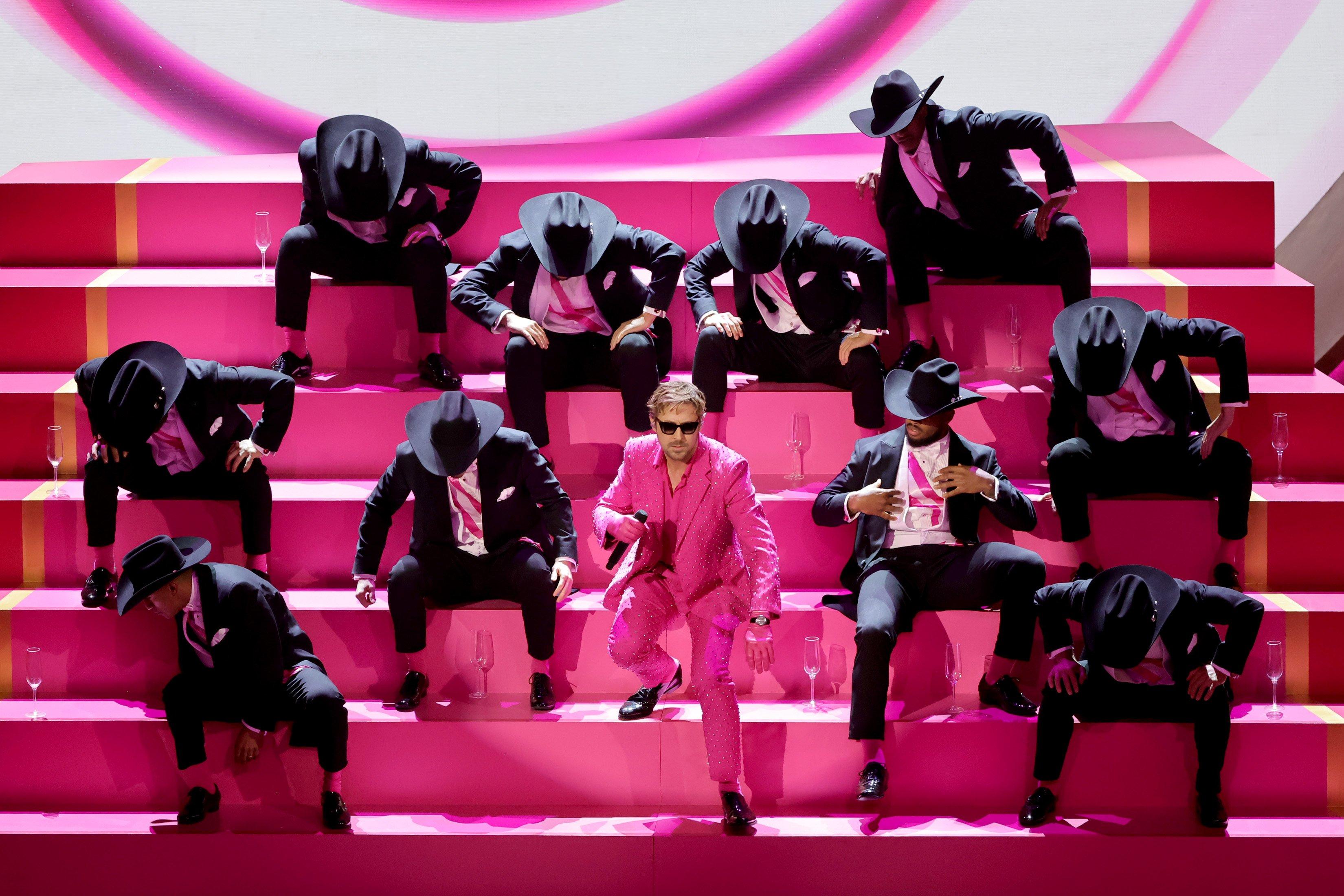
Photo: Kevin Winter/Getty Images
video
2024 Oscars: Watch Ryan Gosling And Mark Ronson Perform A Soaring, Hilarious Version Of "I'm Just Ken" From The Motion Picture 'Barbie'
At the 2024 Oscars, Ryan Gosling and Mark Ronson performed an unforgettable version of "What Was I Made For?" [From The Motion Picture Barbie], which is up for Best Original Song at the ceremony.
At the 2024 Oscars, Ryan Gosling and Mark Ronson performed a jubilant version of "I'm Just Ken" [From The Motion Picture *Barbie*], which is up for Best Original Song at the ceremony.
With an effervescent backing of black-suited dancers, Gosling leaned into the universal male yearning of the instant Barbie classic. And the arena rock magnitude was helped along by two guitar shredders who rightly dominate that world: Slash and Wolfgang Van Halen.
As Gosling put it at CinemaCon in 2023, Gosling initially doubted his Kenergy.
"It was like I was living my life and then one day I was bleaching my hair, shaving my legs, wearing bespoke neon outfits, and rollerblading down Venice Beach," he said.
"It came on like a light scarlet fever and then I woke up one day and was like, 'Why is there fake tanner in my sheets? What just happened?'"
2024 Oscars: Watch Performances & Highlights
2024 Oscars: Watch Billie Eilish And FINNEAS Perform A Heartrending Version Of "What Was I Made For?" From The Motion Picture 'Barbie'
2024 Oscars: Watch Ryan Gosling And Mark Ronson Perform A Soaring, Hilarious Version Of "I'm Just Ken" From The Motion Picture 'Barbie'
2024 Oscars Red Carpet: Music Icons & Artists Shine Including Billie Eilish, Mark Ronson, Danielle Brooks & More
2024 Oscars: Billie Eilish and FINNEAS Win Best Original Song For "What Was I Made For?" From The Motion Picture 'Barbie'
2024 Oscars: Watch Becky G Perform "The Fire Inside" From The 2023 Comedy-Drama ‘Flamin’ Hot’
2024 Oscar Nominees Who Have Won A GRAMMY: Billie Eilish, Martin Scorsese & More
2024 Oscars: Watch Jon Batiste Perform A Poignant Rendition Of "It Never Went Away" From The Documentary Film 'American Symphony'
2024 Oscars: Ludwig Goransson's Masterful Composition for 'Oppenheimer' Wins Best Original Score
2024 Oscars: Watch Scott George and the Osage Singers Perform "Wahzhazhe (A Song For My People)" From 'Killers Of The Flower Moon'
'The Last Repair Shop' Filmmakers Share Behind-The-Scenes Stories About Oscar-Winning Documentary
How Afrobeats Star Bobi Wine Took On Uganda’s Dictatorship
Billie Eilish and FINNEAS won the Oscar for Original Song for "What Was I Made For?" [From The Motion Picture Barbie] at the 2024 Academy Awards.
Keep checking this space for more updates on the 2024 Oscars — including GRAMMY winners and nominees who are featured during the big night!
